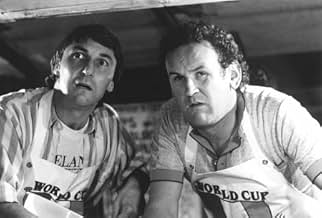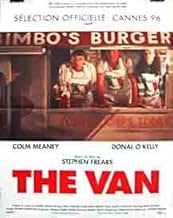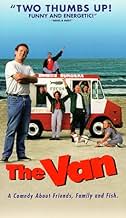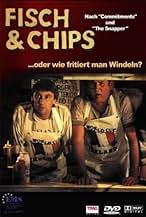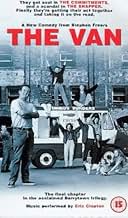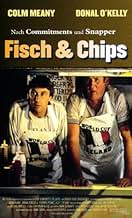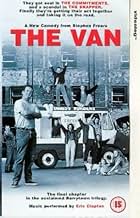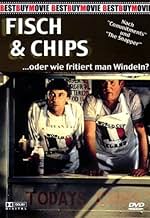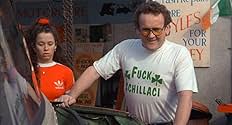Ajouter une intrigue dans votre langueSet in the fictional Dublin suburb of Barrytown, Bimbo is a baker who loses his job after being made redundant. Bimbo then acquires the help of his best friend, Larry, to set up a successful... Tout lireSet in the fictional Dublin suburb of Barrytown, Bimbo is a baker who loses his job after being made redundant. Bimbo then acquires the help of his best friend, Larry, to set up a successful burger van.Set in the fictional Dublin suburb of Barrytown, Bimbo is a baker who loses his job after being made redundant. Bimbo then acquires the help of his best friend, Larry, to set up a successful burger van.
- Récompenses
- 1 nomination au total
Avis à la une
This is the story of two men belonging to the the Irish working class who after being sacked decide to start a business with a van for making and selling hamburgers and the like stuff. After a while their mutual relationship turns into a boss-employee one and things began to become worse until because friendship is thicker than money they began again to get well along with each other. The story is told in a half serious half funny way. It's very simple but not the less deep because of that. It's full of amusing episodes and details of everyday life but its very true, authentic and realistic.
Booker prize winner Roddy Doyle , who started life as a school teacher in a depressed neighbourhood in Dublin, the capital of Ireland, offers us a vivid yet humorous slice of life in Dublin at a pivotal time in contemporary Irish history. He tells this story from the perspective of down trodden families living in a depressed yet resilient neighbourhood. What is truly brilliant about this film is not just the hilarious storyline or the magical performances but how it captures the moment when Ireland as a nation got back on its feet and began to embrace Europe and world with renewed confidence. The story is set during the monumental moments of the European Football Championships of 1988, EURO'88 , when the Irish soccer team surprised Europe, and not least the Irish, with their success. It has been said that this event and the continued success of the Irish soccer team in Italia 90 sparked a renewed confidence within Ireland which greatly contributed to the success of the Irish economy in recent years, now known as the Celtic Tiger. The Barrytown trilogy written by Doyle has given us 3 memorable film adaptations in 'The Commitments'; 'The Snapper' and now this the final episode 'The Van'. Roddy Doyle went on to win the Booker prize for 'Paddy Clarke , ha, ha, ha' and is one of the foremost novelists active in Ireland today. His comedy and dialogue use the often thick Dublin working class dialect, which add to the lyrical nature of the scenes. Most of the characters are in turmoil due to their circumstances and the comedy lies in their posturing with each other in a dead-pan, black comedy.
The Van, a 1996 Stephen Frears film who would go on to much better things, takes on the ideas of desperate, inglorious situations and scenarios, such as unemployment, and wraps them up into packages ready to be delivered as comedy. There is nothing at all funny about the situation the two leads in the film find themselves in, but there is something distinctly charming about the way in which they deal with it.
While not essentially British, a given thanks to the over emphasis on how wonderful it was for the characters to witness the Irish football team pull back a goal and hold on for a draw against the English, while most of the other matches go unnoticed. However, it is directed by an Englishman and the film does posses rather a few items that were written about in regards to some growing fears and concerns simmering at the time within the British film industry, with particular attention to the comedy genre. If we recall Claire Monk's writings in the late 1990s, we might think of films such as Brassed Off and The Full Monty as being films depicting jobless British males turning to alternate methods of money making to get by; effectively rendering the crisis of post-industrialism (closure of mines and steel mills) as a crisis of masculinity. She also writes about these films transitioning problematic situations into comic solutions. These ideas and scenarios might be applicable to The Van, a film that spins job-loss and perceived men in crisis into a series of jokes and gags; a film that, like said examples, see the leads turn to either an entertainment or cultural supply and demand industry, in which they eventually come to relish.
One of the two leads in The Van is Bimbo (O'Kelly), a man who has lost his job and gets by off of his redundancy money. The other is Larry (Meaney), and between them, they aim to get a portable fast food outlet up and running. Whilst it's not about becoming strippers or brass-band musicians, it is essentially about two men turning to cooking and meal preparation by way of getting by. Its set up; a male panic, followed by a lot of sitting around complete with head scratching before hitting upon an idea to move into what is a form of the cooking industry, sees the two leads adopt a culinary position; something that Monk may have been alluding two when she describes early 1990s 'new men' as having to now share the once sole motherly burdens; this of course includes cooking and meal preparation. Yes, it's a fast-food van but the progressive realisation that the only way to deal with the 'panic' is to do something thought of initially as somewhat unthinkable and hapless, is certainly explored; the last resort, 'you'll never see me doing that/in one of those things' notion is tested before becoming the source of humour. One character refers to burger vans as portable 'food poisoning', before succumbing to working within one later on.
The van of the title acts as both a physical representation for the nucleus of the two leads' study, but also as a cinematic space in which it is able to play out. When we first encounter the van, it is located in a desolate and sorry place; a place that sees its characters struggle to push their way through all the other hazards around it just to catch a glimpse. The van is broken, worn-out and decrepit – it's seen better days. But the van is transformed; it is updated and goes through a process of modernity before, in time, is back up and running and solving the characters' problems. The process the van goes through is similar to that of the main characters, as these beaten and well-worn individuals whom have seen better days suddenly becoming success stories again; garnering a final day in the sun.
But if The Van is supposed to be a comedy, blending in the harsh and realistic working class life of terrace house living; cramped conditions; redundancy and frustrations with one's overall life with what is, I think, supposed to be a 'feel-good' approach; then it's not a terribly funny one. One of the film's stranger scenes applies a very visceral sense of humour whilst exploiting what little knowledge these perceived men in crisis actually know about the kitchen 'space'; that being when Larry scolds himself whilst trying to deep fry fish and fry eggs, with the fat popping and jumping up onto his forehead and hands thus scolding him. It's an odd scene; a scene in which the male is ill-suited to his culinary surroundings, we are invited to laugh before realising that if he doesn't get back in there, give it another crack and get it right then his life will get doubly worse in an instant.
But The Van has charm, although its charm isn't really enough. It doesn't invite us to laugh at two people on the skids as much as it does invite us to marvel and be entertained at the manner in which they refuse to buckle and hit rock-bottom. The film's humour is too wavy, either settling for scenes in which its characters are under the influence of alcohol or instances in which the burger van is mobbed by a sea of customers all shouting and ordering at once which, and granted, I haven't ordered many meals from many burger vans, but I'm smart enough to know, just doesn't happen. However, you might say its inconsistencies and its broad, uneven feel help in adding to its overall charm of two people just trying to get by; and I wouldn't really begrudge anyone for being fond of it for that.
While not essentially British, a given thanks to the over emphasis on how wonderful it was for the characters to witness the Irish football team pull back a goal and hold on for a draw against the English, while most of the other matches go unnoticed. However, it is directed by an Englishman and the film does posses rather a few items that were written about in regards to some growing fears and concerns simmering at the time within the British film industry, with particular attention to the comedy genre. If we recall Claire Monk's writings in the late 1990s, we might think of films such as Brassed Off and The Full Monty as being films depicting jobless British males turning to alternate methods of money making to get by; effectively rendering the crisis of post-industrialism (closure of mines and steel mills) as a crisis of masculinity. She also writes about these films transitioning problematic situations into comic solutions. These ideas and scenarios might be applicable to The Van, a film that spins job-loss and perceived men in crisis into a series of jokes and gags; a film that, like said examples, see the leads turn to either an entertainment or cultural supply and demand industry, in which they eventually come to relish.
One of the two leads in The Van is Bimbo (O'Kelly), a man who has lost his job and gets by off of his redundancy money. The other is Larry (Meaney), and between them, they aim to get a portable fast food outlet up and running. Whilst it's not about becoming strippers or brass-band musicians, it is essentially about two men turning to cooking and meal preparation by way of getting by. Its set up; a male panic, followed by a lot of sitting around complete with head scratching before hitting upon an idea to move into what is a form of the cooking industry, sees the two leads adopt a culinary position; something that Monk may have been alluding two when she describes early 1990s 'new men' as having to now share the once sole motherly burdens; this of course includes cooking and meal preparation. Yes, it's a fast-food van but the progressive realisation that the only way to deal with the 'panic' is to do something thought of initially as somewhat unthinkable and hapless, is certainly explored; the last resort, 'you'll never see me doing that/in one of those things' notion is tested before becoming the source of humour. One character refers to burger vans as portable 'food poisoning', before succumbing to working within one later on.
The van of the title acts as both a physical representation for the nucleus of the two leads' study, but also as a cinematic space in which it is able to play out. When we first encounter the van, it is located in a desolate and sorry place; a place that sees its characters struggle to push their way through all the other hazards around it just to catch a glimpse. The van is broken, worn-out and decrepit – it's seen better days. But the van is transformed; it is updated and goes through a process of modernity before, in time, is back up and running and solving the characters' problems. The process the van goes through is similar to that of the main characters, as these beaten and well-worn individuals whom have seen better days suddenly becoming success stories again; garnering a final day in the sun.
But if The Van is supposed to be a comedy, blending in the harsh and realistic working class life of terrace house living; cramped conditions; redundancy and frustrations with one's overall life with what is, I think, supposed to be a 'feel-good' approach; then it's not a terribly funny one. One of the film's stranger scenes applies a very visceral sense of humour whilst exploiting what little knowledge these perceived men in crisis actually know about the kitchen 'space'; that being when Larry scolds himself whilst trying to deep fry fish and fry eggs, with the fat popping and jumping up onto his forehead and hands thus scolding him. It's an odd scene; a scene in which the male is ill-suited to his culinary surroundings, we are invited to laugh before realising that if he doesn't get back in there, give it another crack and get it right then his life will get doubly worse in an instant.
But The Van has charm, although its charm isn't really enough. It doesn't invite us to laugh at two people on the skids as much as it does invite us to marvel and be entertained at the manner in which they refuse to buckle and hit rock-bottom. The film's humour is too wavy, either settling for scenes in which its characters are under the influence of alcohol or instances in which the burger van is mobbed by a sea of customers all shouting and ordering at once which, and granted, I haven't ordered many meals from many burger vans, but I'm smart enough to know, just doesn't happen. However, you might say its inconsistencies and its broad, uneven feel help in adding to its overall charm of two people just trying to get by; and I wouldn't really begrudge anyone for being fond of it for that.
When Brenda 'Bimbo' Reeves is laid off he finds himself on the dole and irking out a unfulfilling life with friend Larry. When a 'friend' sells them a clapped out old chip van Bimbo and Larry decide to make a go of it and, once they have removed an inch of grease from the van and worked out how to move it without an engine, they are in business. With the pubs crammed due to the 1990 World Cup, business looks great and, as Ireland continue to win their way through the tournament, things just look like getting better and better.
Being from Northern Ireland myself, I always find something to like in Doyle's very typical delivery and, as such, will always give the films adapted from his work a try. With The Van doing average business in the cinemas, I had to wait till it came onto television before I could get a chance to see it and it was as I expected, an enjoyable working-class fable of friendship set against the backdrop of unemployment. As such it is pretty good providing good humour throughout as well as a nice build of tension between the two friends. What I didn't think it did very well was deliver something beyond the boundaries the film had set itself. By this I mean I had expected that the film would be more realistic whereas it really was more of a fable with a moral about friendship over money; it is not a bad thing that it did this but the film could have been stronger with it in my opinion.
However, for what it tries to do it manages to be slight but amusing with a good little turn into the dramatic towards the end to set up the lesson for the day. The cast fit the bill for this type of material as well; Meaney may well have been in several big American hits but he is more at home here and he is a totally convincing working class Irish man. O'Kelly is just as good for different reasons he is the same class but one who thought he was out; maybe you need to have lived around these sorts of areas but I thought he was realistic enough. The two have good chemistry and the support cast are also good value.
Overall this is not the best of Doyle's films but it is an enjoyable little slice of Irish life albeit very simplified and served up in a sauce of cheerful poverty. The script doesn't go deeper than the superficial issues of friendship but this still work well enough and they produce an enjoyable little Irish fable that is amusing as it delivers a lesson about friendship that is thankfully free of sentimentality or slush.
Being from Northern Ireland myself, I always find something to like in Doyle's very typical delivery and, as such, will always give the films adapted from his work a try. With The Van doing average business in the cinemas, I had to wait till it came onto television before I could get a chance to see it and it was as I expected, an enjoyable working-class fable of friendship set against the backdrop of unemployment. As such it is pretty good providing good humour throughout as well as a nice build of tension between the two friends. What I didn't think it did very well was deliver something beyond the boundaries the film had set itself. By this I mean I had expected that the film would be more realistic whereas it really was more of a fable with a moral about friendship over money; it is not a bad thing that it did this but the film could have been stronger with it in my opinion.
However, for what it tries to do it manages to be slight but amusing with a good little turn into the dramatic towards the end to set up the lesson for the day. The cast fit the bill for this type of material as well; Meaney may well have been in several big American hits but he is more at home here and he is a totally convincing working class Irish man. O'Kelly is just as good for different reasons he is the same class but one who thought he was out; maybe you need to have lived around these sorts of areas but I thought he was realistic enough. The two have good chemistry and the support cast are also good value.
Overall this is not the best of Doyle's films but it is an enjoyable little slice of Irish life albeit very simplified and served up in a sauce of cheerful poverty. The script doesn't go deeper than the superficial issues of friendship but this still work well enough and they produce an enjoyable little Irish fable that is amusing as it delivers a lesson about friendship that is thankfully free of sentimentality or slush.
OK, apparently, Colm Meaney (happy birthday, Colm!) is best known for a "Star Trek" role, but I always associate him with his roles in adaptations of Roddy Doyle novels. They are "The Commitments", "The Snapper" and "The Van". The last one casts as a down-on-his-luck Dubliner who with his friend finds a grimy abandoned van and opens it up. While I mostly liked the movie, it did have the problem of showing the Irish drinking and moping about life's travails; is that the only way to stereotype people from the Emerald Isle? But otherwise, I found it a pretty good look at working-class life in Ireland. Once again, Stephen Frears added another accomplishment to his resume, recently continued with "The Queen". I recommend it, and see whether or not you want to get a bite to eat from any random van after watching this.
Le saviez-vous
- AnecdotesThis is the third story in Roddy Doyle's "Barrytown Trilogy", following the adventures of the Rabbitte family. However, as 20th Century Fox owned the film rights to the Rabbitte name (from The Commitments), the characters had to be re-named in the subsequent film adaptations (The Snapper, The Van).
- GaffesThe movie is set during World Cup 1990, and on at least two occasions, the radio can be heard promoting 98FM. This station did not use this branding until the mid 1990s; it was called Classic Hits at the time.
- Versions alternativesIn the UK in 2007 a re-edited version was passed for certification for video release by the BBFC running at 92 minutes 50 seconds, some 3 minutes 55 seconds shorter than the normal theatrical version.
- Bandes originalesWand'rin' Star
Words by Alan Jay Lerner
Music by Frederick Loewe
© Alan Jay Lerner/Frederick Loewe/Chappell & Co Inc
By Kind Permission of Warner Chappell Music Limited
Meilleurs choix
Connectez-vous pour évaluer et suivre la liste de favoris afin de recevoir des recommandations personnalisées
- How long is The Van?Alimenté par Alexa
Détails
- Date de sortie
- Pays d’origine
- Site officiel
- Langue
- Aussi connu sous le nom de
- La camioneta
- Lieux de tournage
- Sociétés de production
- Voir plus de crédits d'entreprise sur IMDbPro
Box-office
- Montant brut aux États-Unis et au Canada
- 712 095 $US
- Week-end de sortie aux États-Unis et au Canada
- 23 366 $US
- 18 mai 1997
- Montant brut mondial
- 714 197 $US
- Durée
- 1h 40min(100 min)
- Couleur
- Mixage
- Rapport de forme
- 1.85 : 1
Contribuer à cette page
Suggérer une modification ou ajouter du contenu manquant


